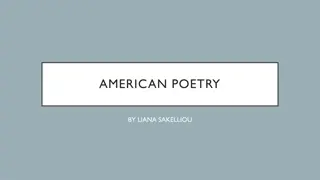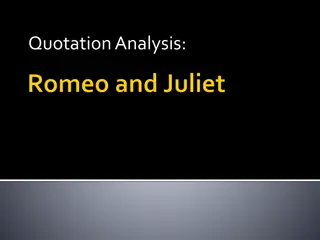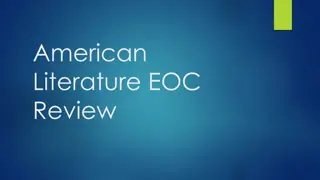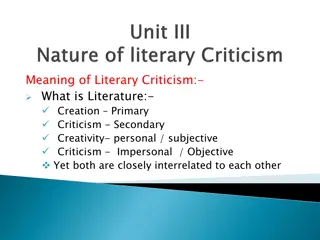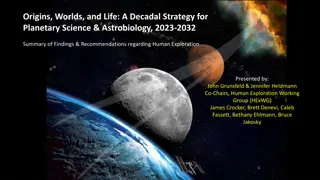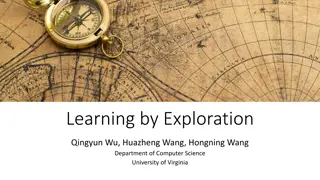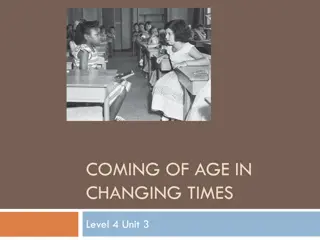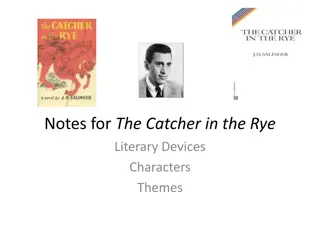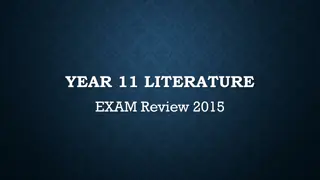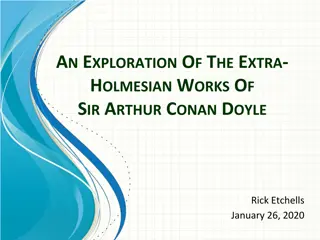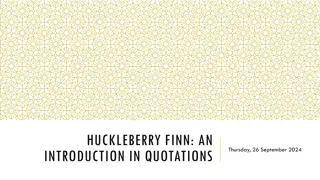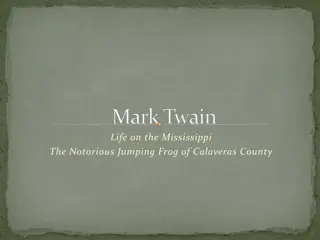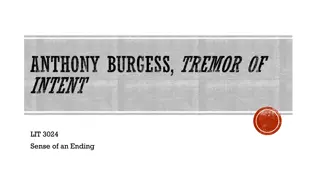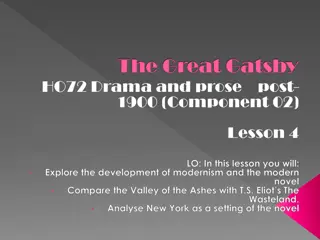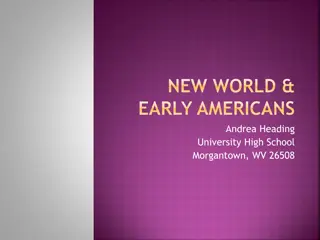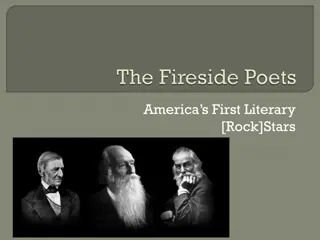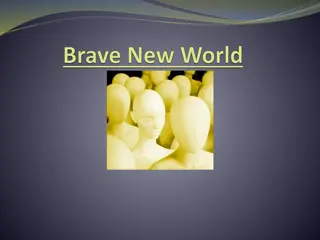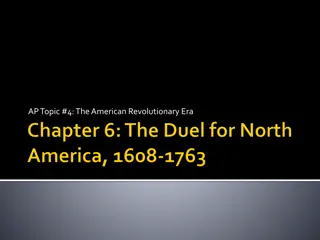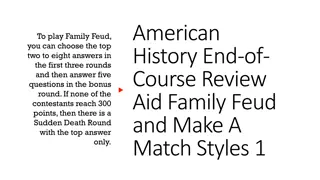The Great American Novel: A Literary Exploration
The concept of the Great American Novel has been a subject of discussion in literary circles, aiming to capture the essence of American culture and society. Coined in the 19th century, it has evolved over time, with various criteria and contenders for the prestigious title. This piece delves into the history, development, criteria, and contenders of this elusive literary distinction.
Uploaded on Sep 14, 2024 | 0 Views
Download Presentation

Please find below an Image/Link to download the presentation.
The content on the website is provided AS IS for your information and personal use only. It may not be sold, licensed, or shared on other websites without obtaining consent from the author. Download presentation by click this link. If you encounter any issues during the download, it is possible that the publisher has removed the file from their server.
E N D
Presentation Transcript
THE GREAT AMERICAN NOVEL Monterey Peninsula College GENT 13: The End of Innocence Stephanie Spoto Gentrain
The Great American Novel is Dead "The GAN is either as extinct as the Dodo or as far in the future as the practical aeroplane -Frank Norris, journalist and novelist, 1901
The Great American Novel Canonical novel portrays the true essence of America Usually written by an American Explores the issue of national character History of term: John William Forest (1868) coined term in essay for The Nation. Was a demand for a novel to embody America, to be accurate portrayal Called Uncle Tom s Cabin (Harriet Beecher Stowe, 1952) the closest thing to The Great American Novel Said of Uncle Tom s Cabin: "It was a picture of American life, drawn with a few strong and passionate strokes, not filled in thoroughly, but still a portrait." Claimed the true Great American Novel had not been written yet
The Development of the Concept Over the next several decades the term became popular used regularly in literary reviews Eventually became considered to be a clich term Idea of Great American Novel became part of greater national and culturally consolidation unification of American culture Grant Shreve: "[t]he dream of a unifying national book had been around since the earliest days of the Republic, but the Great American Novel didn't fully get as a concept until the end of the Civil War".
Criteria for the Great American Novel 1. It must encompass the entire nation and not be too consumed with a particular region. 2. It must be democratic in spirit and form. 3. Its author must have been born in the United States or have adopted the country as his or her own. 4. Its true cultural worth must not be recognized upon its publication.
Contenders for the title of the Great American Novel Pre-1945 The Last of the Mohicans (1826) Scarlet Letter (1850) Moby-Dick (1851) Uncle Tom s Cabin (1852) Adventures of Huckleberry Finn (1884) The Great Gatsby (1925) Gentlemen Prefer Blondes (1925) Absalom, Absalom! (1936) The Grapes of Wrath (1939)
The waning of the Great American Novel th Idea continues to develop, but first half of 20 dismissed as no longer applicable Considered extinct as the Dodo. George Knox, 1969, in American Quarterly: by 1900, critics no longer wanted to call on the idea of the GAN would be ridiculed Edith Wharton, 1927: the Great American Novel concept held a narrow view and was "always about Main Street, geographically, socially, and intellectually". term GAN used too often, and too often associated with masculine values Academia began to dismiss GAN as "naively amateurish age-of-realism pipe dream" Bernard F. Rogers, 1974: The GAN really belongs to the nineteenth century, not the twentieth This trend continued to the middle of the 20 century it was increasingly th century.
Constructing the GAN Some continued self-consciously to write and attempt to write the GAN, for example, Philip Roth, Upton Sinclair, Sinclair Lewis Upton Sinclair, The Jungle (1906) Lewis Sinclair, Babbit (1924) Philip Roth, The Great American Novel (1973) Guide books for writing the Great American Novel appeared throughout the 20 century Writers like Kurt Vonnegut career can be understood as an attempt to write the GAN of its own time. th
Renewed interest in the 1970s William Carlos Williams, 1923, The Great American Novel Clyde Brion Davis, 1938, The Great American Novel Philip Roth, 1973, The Great American Novel Keith Malley, 2000, The Great American Novel 1970s saw a renaissance in interest in Great American Novel New York Times very interested in the concept, and mentioned and concept often Tom Perrin, 2018: renewed interest in GAN was due to decades considerable anxieties, perhaps of identity During this time was solidified as aligned with masculinity, sought to address tension between individualism and social upheaval.
Contenders for the GAN title, post-1945 Salinger, Catcher in the Rye, 1951 Ellison, Invisible Man, 1952 Nabakov, Lolita, 1955 Lee, To Kill a Mockingbird, 1960 Pynchon, Gravity s Rainbow, 1973 McCarthy, Blood Meridian, 1985 Morrison, Beloved, 1987
The Great American Novel and the New Millennium st 21 Lists of Great American Novels popular on websites like Medium or BuzzFeed Relevance and achievability debated is America singular enough to be embodied in a single work? Adam Kirsh, 2013: "Hardly anyone talks about the Great American Novel without a tincture of irony these days". though novels like Philip Roth very interested in attempting to write the GAN On GAN in 21 century, Stephens Shapiro "Maybe the GAN is a theme that rises in interest when the existing world system is amidst transformation, as America's greatness of all kinds swiftly fades away." Norman Mailer, 2004: GAN no longer possible, because America is too developed Tony Tulathimutte similarly dismissed it as "a comforting romantic myth, which wrongly assumes that commonality is more significant than individuality" century focused on click-bait and lists st
Millennium and Contenders for the GAN Bret Easton Ellis, American Psycho, 1991 David Foster Wallace, Infinite Jest, 1997 Don DeLillo, Underworld, 1997 Jonathan Franzen, Freedom, 2010 Michael Chabon, Telegraph Avenue, 2012


